Understanding the Neurological Underpinnings of Stress-Induced Memory Changes
Stress influences the brain's structure and function in profound ways, affecting cognitive abilities, particularly memory. This article explores how stress hormones, neural pathways, and brain regions intersect, leading to memory loss or enhancement, and offers strategies for safeguarding cognitive health.
The Physiological Response to Stress and Its Neural Targets
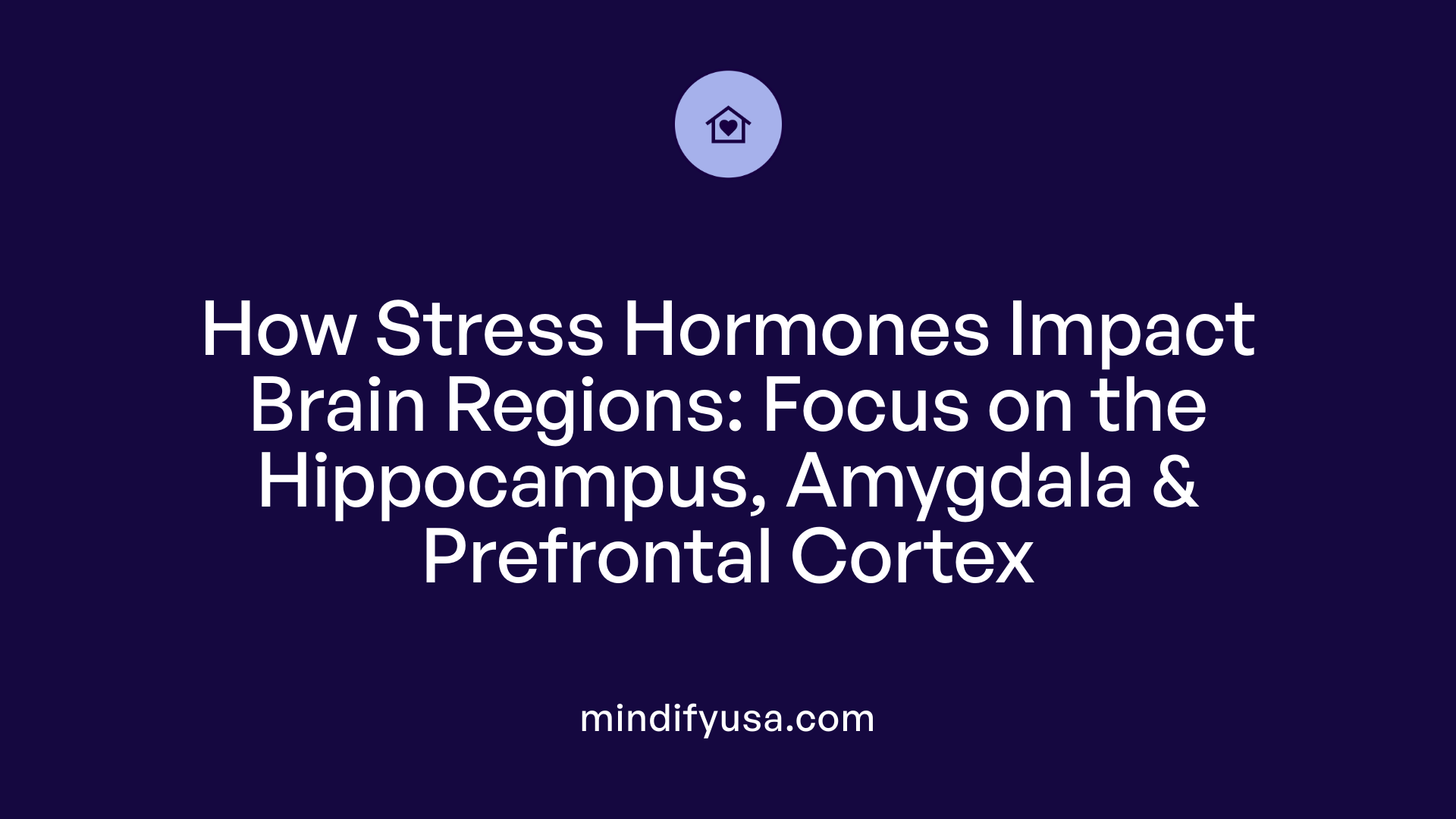
How does the sympathetic nervous system activation relate to stress?
In response to a threatening or challenging event, the sympathetic nervous system is quickly activated, initiating the fight-or-flight response. This state increases physiological arousal through elevated heart rate, faster respiration, and heightened blood flow directing energy toward muscles and vital organs. These changes prepare the body to confront or escape from stressors, sharpening alertness and physical readiness.
What is the role of the hypothalamic-pituitary-adrenal (HPA) axis in stress?
Simultaneously, the hypothalamic-pituitary-adrenal (HPA) axis is engaged, regulating longer-term, systemic responses. The hypothalamus releases corticotropin-releasing hormone (CRH), which stimulates the pituitary gland to secrete adrenocorticotropic hormone (ACTH). ACTH then prompts the adrenal glands to produce glucocorticoids, primarily cortisol in humans. Cortisol helps mobilize energy reserves but, if elevated persistently due to chronic stress, can damage brain structures involved in memory and regulation of emotions.
How are stress hormones like cortisol and norepinephrine released?
Cortisol and norepinephrine are key hormones released during stress. Norepinephrine acts quickly to increase heart rate and blood pressure, supporting immediate physical responses. Cortisol, on the other hand, has a slower onset but sustains alertness and energy availability. These hormones access the brain via blood circulation, binding to specific receptors in regions such as the hippocampus, amygdala, and prefrontal cortex, influencing their function.
What impact does stress have on brain regions like the hippocampus, amygdala, and prefrontal cortex?
The effects of stress hormones on the brain depend on duration and intensity. In the hippocampus, prolonged high levels of cortisol can lead to structural changes such as dendritic atrophy, reduced neurogenesis, and overall shrinkage. These alterations impair memory formation, learning, and spatial navigation.
In the amygdala, stress tends to increase activity, which elevates fear and emotional responses but may hinder cognitive flexibility.
Meanwhile, the prefrontal cortex, responsible for decision-making, working memory, and executive functions, experiences reduced synaptic connections under chronic stress, leading to decreased cognitive control and impairments in attention and problem-solving.
Understanding how these systems interact underscores the importance of managing stress to protect neural health and cognitive function.
Mechanisms Linking Chronic Stress to Brain Structural Damage
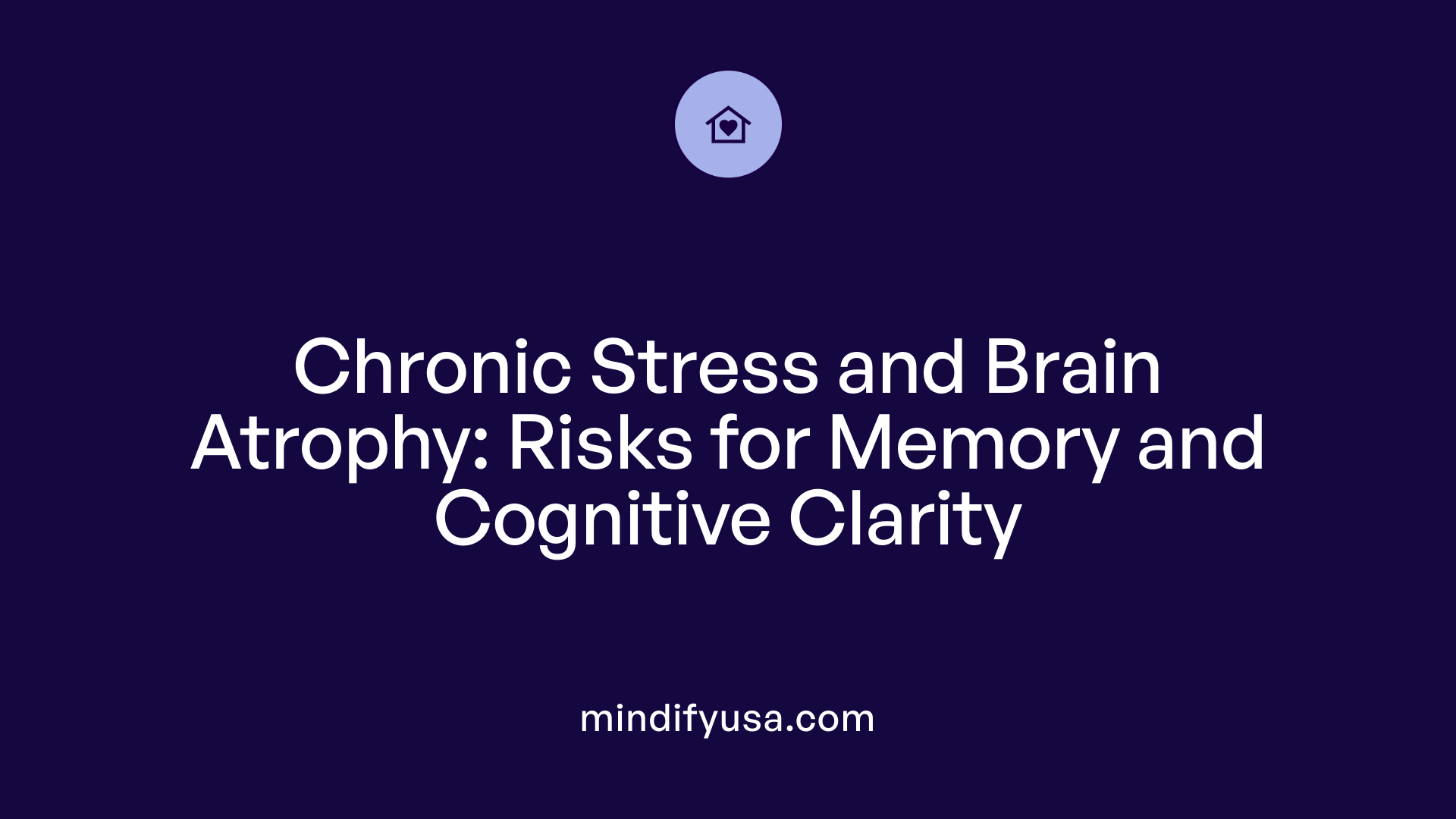
Can stress cause memory loss and confusion?
Stress, especially when chronic or severe, can significantly impact memory and cognitive clarity. High levels of stress hormones such as cortisol can lead to structural and functional changes in critical brain regions responsible for memory and decision-making, notably the hippocampus and prefrontal cortex.
Prolonged exposure to elevated cortisol levels causes neuronal atrophy, synaptic loss, and decreases in neurogenesis within these areas. For instance, the hippocampus, vital for encoding and retrieving memories, can shrink in size due to stress-related damage, leading to difficulties in forming new memories or recalling existing ones.
This neurodegeneration contributes to cognitive phenomena like memory loss, confusion, and diminished executive functions. Additionally, stress is linked to neurobiological alterations seen in aging and neurodegenerative diseases like dementia, although it is not considered the sole cause.
While acute stress might temporarily impair memory retrieval, persistent stress compounds these effects through structural brain damage, which may result in long-term deficits. Managing stress through lifestyle interventions, mindfulness, and psychological support can help mitigate these risks and preserve cognitive health.
Understanding the connection between chronic stress and brain damage underscores the importance of stress management in preventing memory-related issues and maintaining mental clarity over time.
The Role of Glucocorticoids and Neurotoxic Effects on Memory
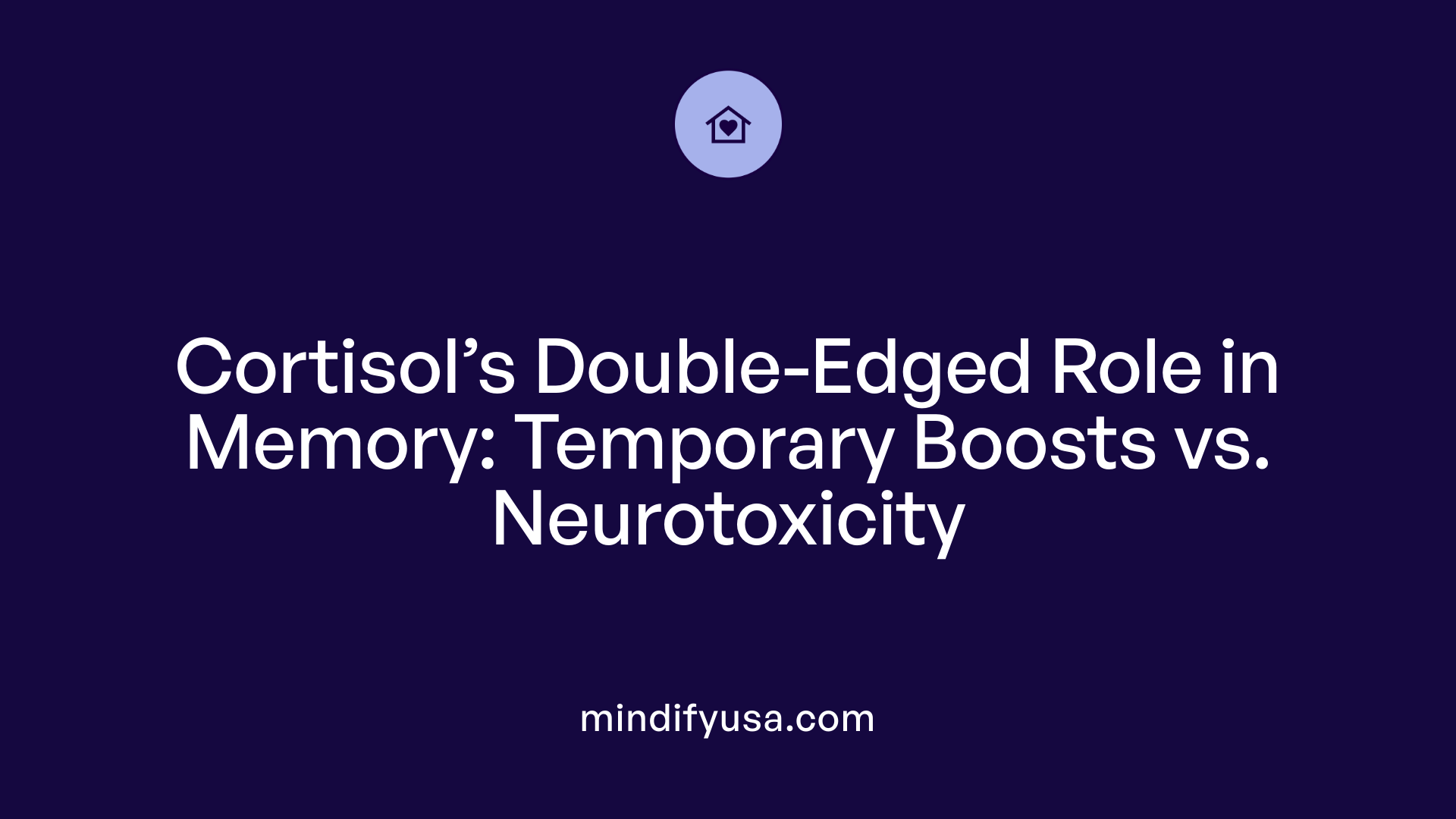
How do hormones like cortisol contribute to stress-related memory decline?
Cortisol, a primary hormone released during stress, has a complex influence on memory processes. In short bursts of acute stress, moderate cortisol levels can actually boost memory, especially for emotional events. This is because cortisol enhances connectivity within the hippocampus, a brain region vital for memory formation, helping to strengthen emotional memories and improve encoding.
However, this positive effect is temporary. When stress becomes chronic, prolonged high cortisol levels can be detrimental. Excess cortisol damages hippocampal neurons, causing neural atrophy, shrinking of hippocampal volume, and decreased neurogenesis — the creation of new neurons. These structural changes impair the hippocampus's ability to support memory, leading to difficulties in learning and recalling information.
Moreover, the timing of cortisol secretion greatly influences its impact. Elevated cortisol during memory retrieval impairs recallability, while its release during encoding might temporarily aid the process under certain conditions. Over time, sustained high cortisol levels contribute to neurodegeneration and cognitive decline, particularly affecting memory and learning capabilities.
In essence, cortisol's role in memory is dual: it can temporarily facilitate emotional memory formation during stressful moments but, if elevated chronically, it becomes neurotoxic, threatening hippocampal integrity and overall cognitive health.
The Differential Effects of Stress and the Brain’s Response to Emotional Versus Neutral Memories
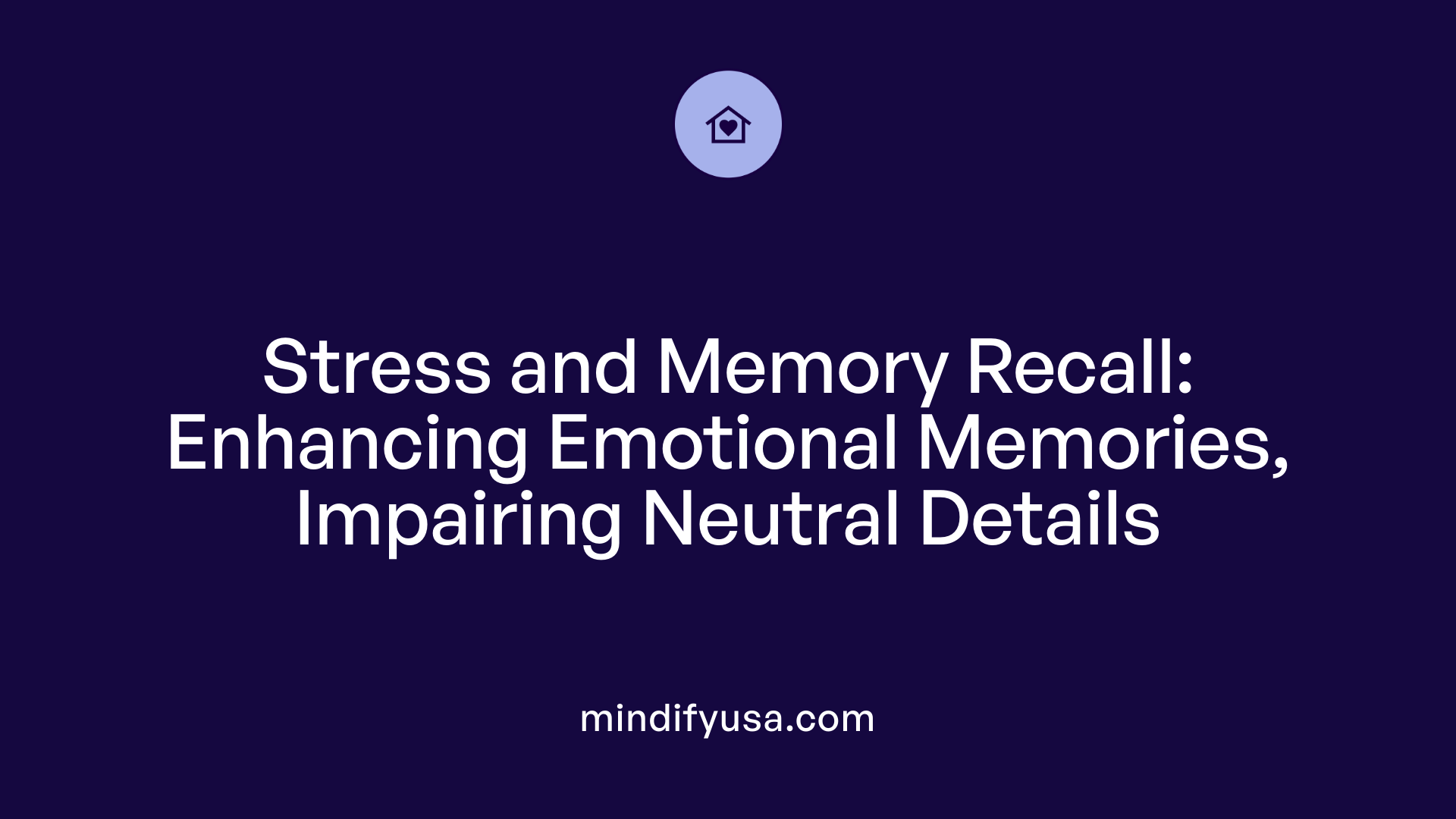
Does stress affect memory recall?
Stress has a complex impact on how we remember information. Generally, it tends to impair memory retrieval, especially when cortisol levels are high during or just before trying to recall information. Acute stress can disrupt neural activities in vital brain regions such as the hippocampus—which is responsible for memory formation—and the prefrontal cortex, involved in decision-making and working memory.
However, research shows that stress isn’t universally detrimental. Moderate or emotionally charged stress can actually strengthen certain types of memories, particularly those linked to emotional experiences. This phenomenon occurs because stress enhances connectivity within the hippocampus and activates the amygdala, a brain region critical for processing emotions.
The timing and context of stress play crucial roles. If stress occurs during memory encoding, it may help cement emotional memories more vividly. Conversely, stress around the time of memory retrieval can hinder access to stored memories, particularly neutral or contextual details.
Some studies indicate that the emotional aspect of memories under stress might be selectively enhanced, leading to vivid, intrusive memories typical of traumatic stress reactions. Emotional memories tend to be more resilient to forgetting, especially when stress activates the amygdala and increases its communication with the hippocampus.
In summary, stress doesn’t always impair memory—it also has the potential to enhance emotional memories. But most often, especially under persistent or intense stress conditions, it hampers the recall of neutral details and impairs cognitive flexibility.
How stress activates the amygdala and influences hippocampal connectivity
The amygdala becomes hyperactive during stressful events, particularly when emotional content is involved. This heightened activity facilitates the storage of emotionally significant memories, making them more vivid and persistent.
This process involves increased connectivity between the amygdala and the hippocampus, strengthening emotional memories. This neural collaboration enhances the encoding and consolidation of emotional experiences, which can sometimes lead to intrusive memories seen in conditions like PTSD.
Additionally, stress-induced hormonal changes, notably elevated cortisol, influence hippocampal function. While acute cortisol spikes can temporarily boost emotional memory encoding, prolonged exposure damages the hippocampal neurons, reducing its volume and impairing the ability to remember neutral or non-emotional details.
Vivid, intrusive memories in traumatic stress
In traumatic stress or PTSD, memory can become over-potentiated, resulting in vivid, intrusive recollections of distressing events. These memories often lack contextual clarity, meaning individuals might re-experience aspects of the trauma as if they are happening again.
This phenomenon correlates with overactivation of the amygdala and decreased function in the hippocampus, impairing the ability to contextualize memories properly. Consequently, emotional memories become highly accessible and persistent, fueling symptoms of flashbacks and hyperarousal.
Understanding these neural mechanisms highlights why emotional memories under stress tend to be more durable and vivid, sometimes to the point of causing significant psychological distress. Managing stress and its effects on brain regions involved in emotional memory processing can be critical in therapeutic settings.
| Aspect | Effect | Brain Regions Involved | Notes |
|---|---|---|---|
| Emotional memory enhancement | Increased | Amygdala, hippocampus | Reinforces emotionally charged experiences |
| Neutral memory impairment | Decreased | Hippocampus, prefrontal cortex | Disrupted during high stress |
| Intrusive traumatic memories | Persistent & vivid | Amygdala, hippocampus | Characteristic of PTSD |
| Connective activity | Strengthened | Amygdala & hippocampus | Facilitates emotional memory encoding |
This understanding of stress and memory emphasizes its dual effects—facilitating emotional memory while impairing neutral, contextual details—shaped by changes in brain connectivity and activity levels.
Stress and Brain Plasticity in Aging and Disease Progression
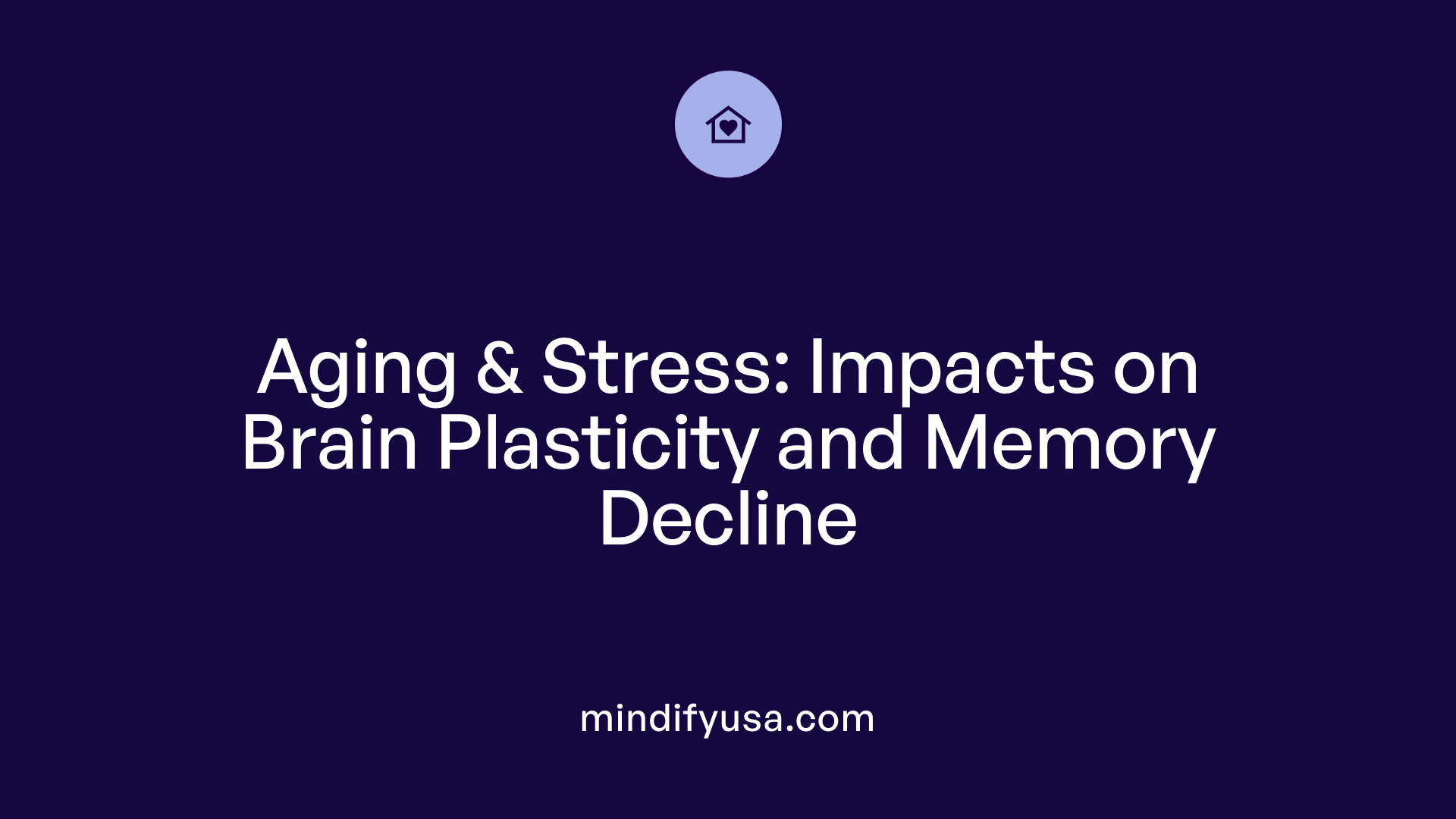
What is the relationship between stress and memory loss?
Stress significantly impacts memory by influencing critical brain areas such as the hippocampus and prefrontal cortex, which are essential for encoding, retrieving, and managing flexible memories.
Acute stress can temporarily boost memory, especially for emotionally charged events, by activating the amygdala. This heightened arousal facilitates the encoding and consolidation of salient information. However, acute stress can impair memory retrieval, particularly of contextual or neutral information, due to effects on the hippocampus.
In contrast, chronic stress—characterized by prolonged high levels of glucocorticoids like cortisol—can damage these brain regions structurally and functionally. Such damage includes dendritic atrophy, reduced neurogenesis in the hippocampus, and synaptic loss. These alterations weaken neural plasticity, leading to difficulties in forming new memories, retrieving existing ones, and maintaining cognitive flexibility.
Furthermore, individuals experiencing persistent stress often show hippocampal atrophy and impairments in spatial memory and executive functions. In older adults and those with mild cognitive impairment (MCI), elevated cortisol levels over time are associated with faster memory decline and greater vulnerability to neurodegenerative processes.
Interestingly, some research suggests a dual role of cortisol. While high levels tend to be neurotoxic, certain studies indicate that in MCI, higher cortisol might temporarily support cognitive function, possibly through compensatory mechanisms or altered hippocampal responses. Nonetheless, the overall trend shows that sustained stress and associated hormonal dysregulation contribute to memory deficits and could accelerate progression toward diseases such as Alzheimer’s.
More research exploring how stress management can mitigate these effects holds promise for preserving cognitive health during aging. Strategies like mindfulness, physical activity, and reducing life stressors can help maintain brain plasticity and prevent memory deterioration.
For a comprehensive understanding, here’s a summary of how stress impacts brain structures involved in memory:
| Brain Region | Effect of Stress | Impact on Memory | Additional Notes |
|---|---|---|---|
| Hippocampus | Shrinkage, dendritic atrophy, reduced neurogenesis | Impaired memory formation and retrieval | Damage linked to chronic cortisol exposure |
| Prefrontal Cortex | Synaptic loss, reduced connectivity | Difficulties in working memory and decision-making | More vulnerable in chronic stress scenarios |
| Amygdala | Increased activity | Enhanced emotional memory, heightened fear responses | Overactivity can overshadow hippocampal functions |
Understanding these relationships emphasizes the importance of managing stress for brain health, especially during the aging process and in neurodegenerative conditions.
Scientific Insights from Recent Research on Stress and Memory
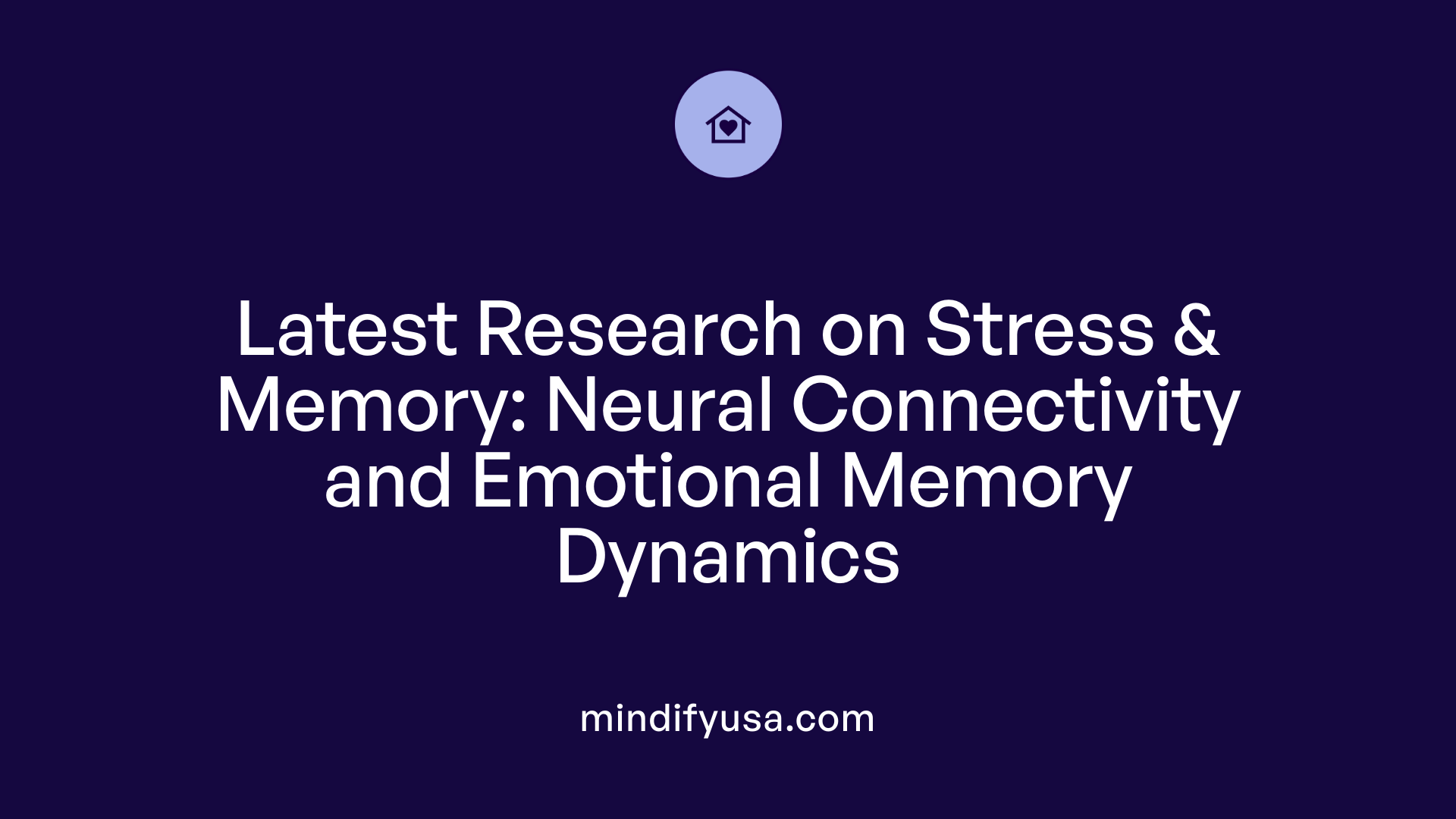
What research findings shed light on the stress-memory connection?
Recent scientific studies have deepened our understanding of how stress hormones like cortisol influence memory processes. A notable example is a study conducted by Yale researchers involving 27 participants, which was published in the Journal of Neuroscience in October 2023. In this study, participants received either cortisol or placebo pills and were then exposed to images of objects and scenes while undergoing functional magnetic resonance imaging (fMRI).
The results showed that cortisol increased connectivity within the hippocampus, particularly in areas linked to emotional memories. Interestingly, higher emotional responses during cortisol administration were associated with better memory retention for scenes connected to objects. This indicates that under certain conditions, stress and cortisol can enhance the encoding and consolidation of emotional memories, reflecting an adaptive response.
Neuroimaging findings further reveal that stress affects brain connectivity in complex ways. While acute stress can temporarily strengthen emotional memories, prolonged or chronic stress tends to cause structural damage in regions vital for memory, such as the hippocampus. This damage may include dendritic atrophy, reduced neurogenesis, and overall hippocampal shrinkage, which collectively impair memory formation and retrieval.
The neural responses to stress are highly dependent on factors like timing, emotional salience of the memory, and stress duration. In the short term, stress hormones can facilitate memory for salient, emotionally charged information. However, ongoing or excessive stress can lead to detrimental structural and functional changes, impairing cognition over time.
Strategies for Mitigating Stress-Related Memory Decline and Enhancing Cognitive Resilience
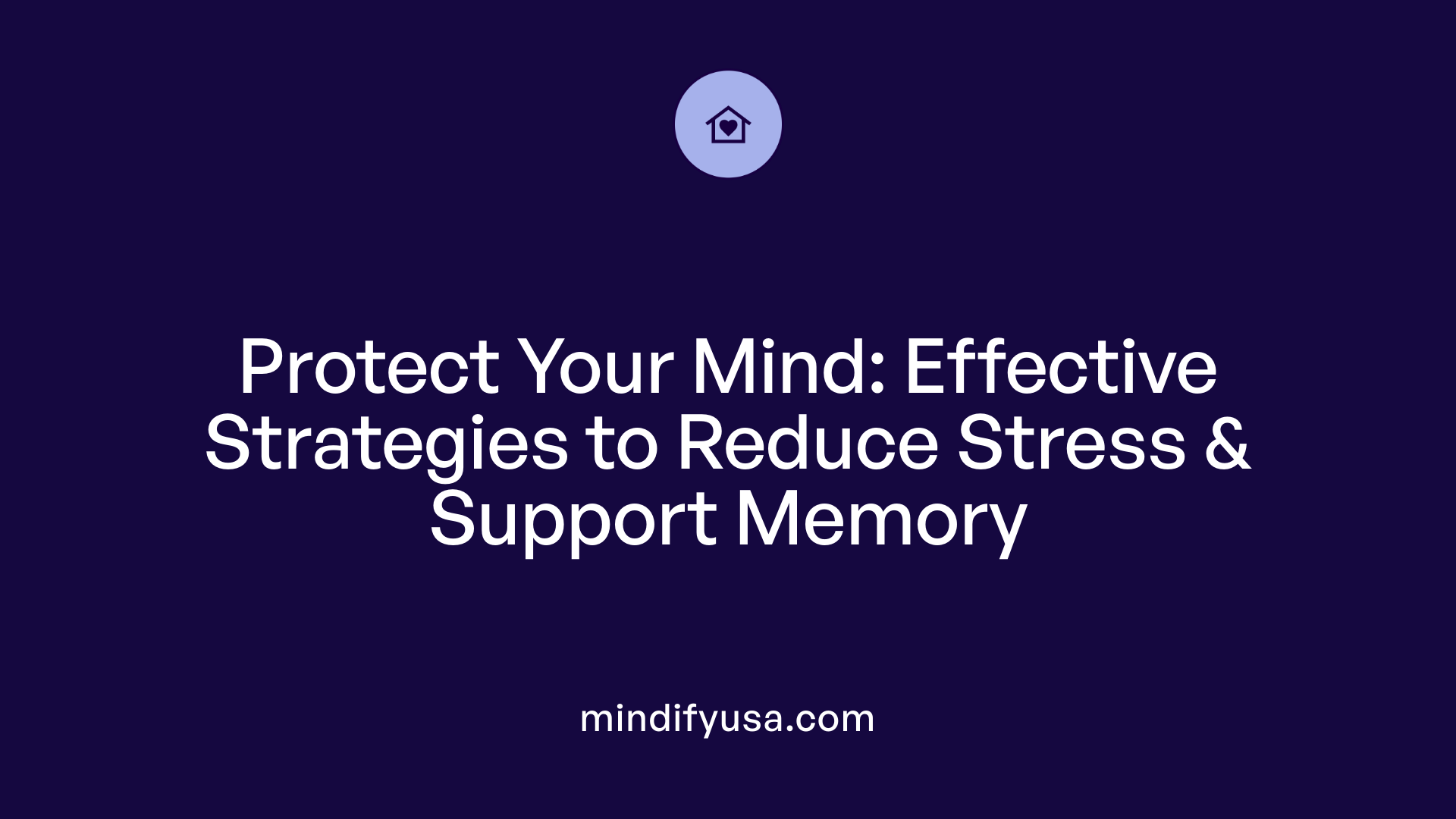
What strategies can help manage stress to protect cognitive health and memory?
Managing stress effectively plays a vital role in safeguarding cognitive functions and memory. Since long-term exposure to high cortisol levels resulting from chronic stress can damage the hippocampus, a brain region integral to memory formation, adopting strategies to reduce stress is essential.
Techniques such as mindfulness meditation, deep breathing exercises, and progressive relaxation help calm the nervous system, lowering cortisol levels and reducing inflammation in the brain. Regular physical activity — particularly aerobic exercise — enhances neurogenesis and hippocampal volume, counteracting stress-related damage. Maintaining a structured routine, ensuring sufficient sleep, and organizing daily tasks mitigate stress triggers and improve resilience.
Social engagement and emotional support from friends, family, and mental health professionals further buffer against stress impacts. A positive attitude and stress-coping skills, including cognitive-behavioral techniques, help individuals respond adaptively to stressors.
In addition to psychological strategies, adopting a healthy lifestyle—such as controlling blood pressure, managing diabetes, and maintaining heart health—supports overall brain health. Holistic approaches combining mental, physical, and social activities contribute to preserving memory and cognitive function over time.
Ultimately, early intervention and consistent stress management can slow neurodegenerative processes, improve quality of life, and sustain cognitive resilience well into older age.
Closing Thoughts: The Crucial Role of Lifestyle and Stress Management in Preserving Memory
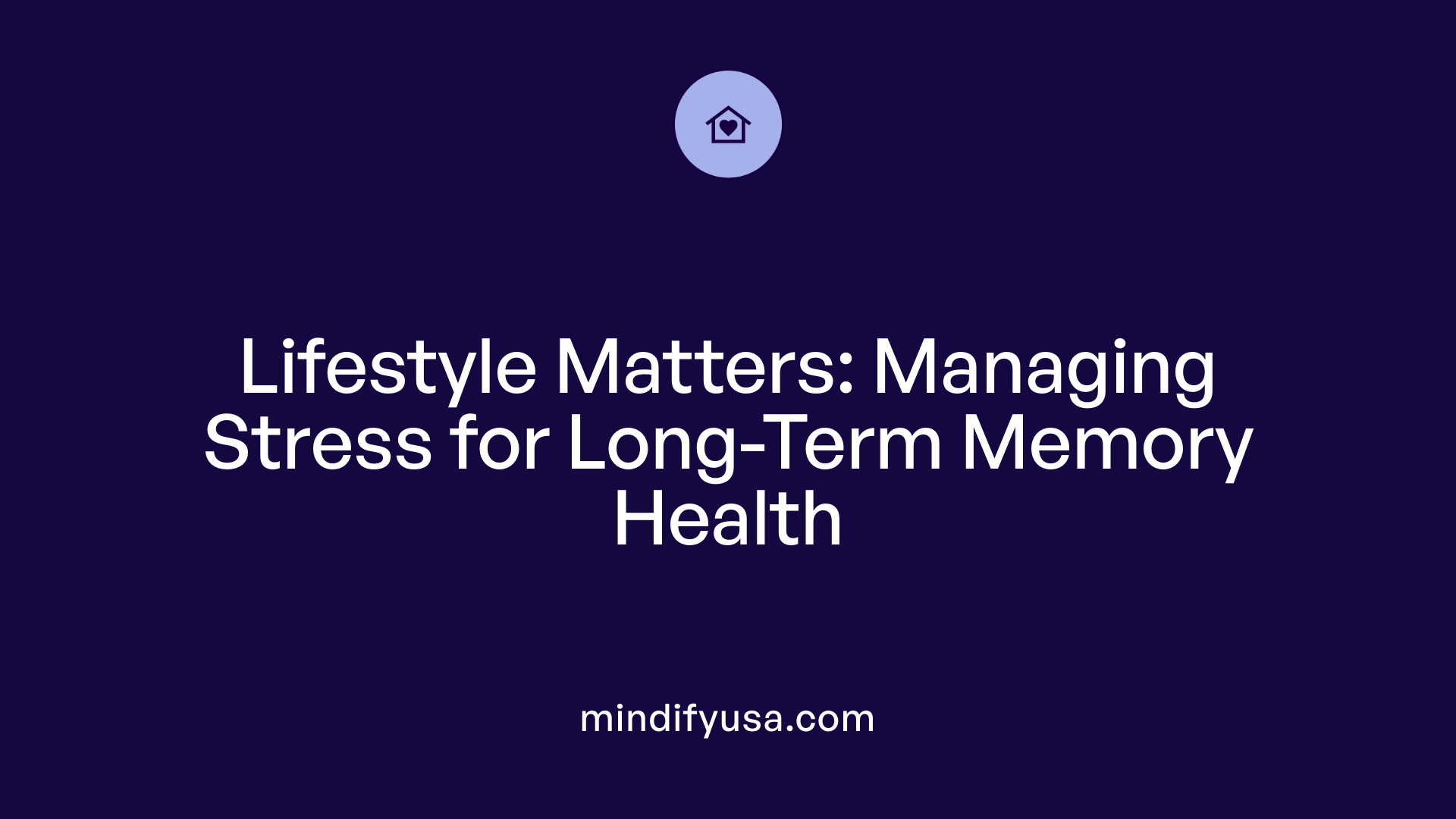
Why is early stress intervention important?
Managing stress early on is vital for safeguarding cognitive health. Chronic stress elevates cortisol levels over time, leading to structural damage in brain regions like the hippocampus, which is central to memory formation. This damage can accelerate cognitive decline and increase vulnerability to neurodegenerative diseases such as dementia. By recognizing and addressing stress early, individuals can reduce its long-term impact, maintain healthier brain structure, and preserve memory function.
What are holistic approaches to cognitive preservation?
A comprehensive approach to protecting memory involves lifestyle modifications such as regular physical activity, a balanced diet, mindfulness practices, and adequate sleep. Physical exercise, in particular, has been shown to boost neurogenesis in the hippocampus and lower cortisol levels. Mindfulness and relaxation techniques help decrease inflammation and regulate hormonal responses. These strategies work synergistically to promote brain resilience, counteract stress effects, and support overall cognitive vitality.
Can the brain recover from stress-induced damage?
Research indicates that the brain exhibits neuroplasticity—the ability to reorganize and recover from injury. Interventions like consistent exercise, cognitive training, and stress reduction techniques can enhance neurogenesis and strengthen neural connections. For example, increasing activity of brain cell proteins such as cannabinoid receptor type 1 (CB1) has been associated with resilience. While damage from long-term stress can be substantial, proactive efforts to lower cortisol and stimulate neural growth provide hope for recovery and functional improvement.
Why should individuals adopt proactive health habits?
Proactive behaviors—such as managing stress through physical activity, maintaining social connections, and seeking mental health support—are key to maintaining memory health. These habits help lower cortisol, promote neurogenesis, and prevent structural brain changes linked to aging and stress. Taking control of lifestyle factors not only enhances memory and cognitive function but also reduces the risk of developing stress-related neurodegenerative conditions.
Does memory loss from stress reverse?
Memory impairments caused by stress may often be reversible with effective management. Chronic exposure to high cortisol levels damages hippocampal neurons, diminishes neurotrophic factors like BDNF, and hampers synaptic plasticity. However, interventions such as regular aerobic exercise can promote hippocampal neurogenesis and restore memory functions through pathways like AMPK activation. Relaxation, mindfulness, and physical activity help lower cortisol and repair stress-induced damage. The likelihood of reversal is higher if stress is identified and addressed early, before severe structural damage occurs.
Harnessing Knowledge to Boost Cognitive Vitality
Understanding the complex interactions between stress hormones, brain structures, and memory processes underscores the importance of effective stress management. By adopting lifestyle strategies and early interventions, individuals can mitigate stress's damaging effects on the brain and promote lasting cognitive resilience. Continued research will further illuminate the pathways that connect emotional well-being and memory health, guiding more targeted therapies in the future.
References
- Effects of Chronic Stress on Memory Decline in Cognitively Normal ...
- Memory Impairments Associated with Stress and Aging - NCBI
- Stress Amplifies the Brain's Ability to Encode Memory, New Study ...
- Protect your brain from stress - Harvard Health
- The Brain and Stress - American Brain Foundation
- Memory Under Stress: From Adaptation to Disorder - ScienceDirect
- Stress and Memory Loss: What You Need to Know






































































































